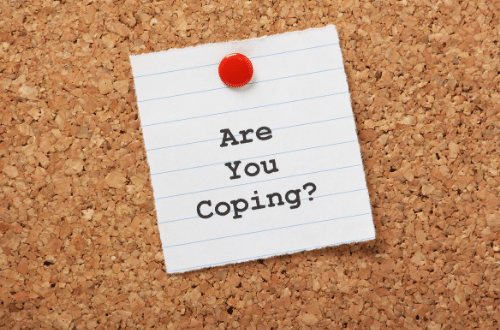I Can't Handle Adulthood: What Do I Do?
Raise your hand if you’ve ever woken up questioning your entire life so far and stressing about the uncertainty of your future and then just gave up and got Chipotle. Raise your hand if you’ve ever just wanted to just trade lives with your dog for a day (or maybe longer) because you figure life would just be so much easier that way! If you’ve raised your hand to any of these, congratulations you are not alone--welcome to the “I hate being an adult” club!
Whether it’s your commute to work, work load, student loan debt, the pressures of dating, getting an oil change, doing household chores, or remembering to buy more toilet paper and dish soap, the responsibilities of an adult life can feel overwhelming and difficult to handle.
What Is Meant By “Adulting”?
The word adulting is an informal term (coined by Millenials and Gen Z) to describe behavior that is seen as responsible and grown-up. This behavior consists of meeting the day-to-day demands of independent and professional living. But this term undermines the simple fact that part of actually being an adult and doing tasks such as cooking, paying bills, or laundry are essential to keeping us alive.
10 Reasons Why Adulting Is So Hard
We have to support ourselves (and our own family) with depreciating dollars.
We have to clean more than just our room.
Paying bills, insurance, and taxes.
We have to be our own alarm clock.
We have to feed ourselves, and any other people/pets in our household.
We have to budget our money to get ahead in life.
Scheduling and managing our own time.
Getting oil changes and any other maintenance that needs to be done on our vehicles.
Feeling like we never have enough free time.
The pressure to succeed and keep up with everyone else around us.
I could probably come up with about 10 more reasons why adulting is hard... but you get the idea. You will note that the above list is concerned with paying out, managing money or earning enough money to survive. It puts you on a treadmill to earn money which is losing value faster than you can make it and many, unable to put their finger on it, would rather not grow up and think about that depressing cycle.
What is the hardest thing about adulting?
As stated above, being an adult comes with a lot of responsibility. Responsibilities can vary; however, all adults have responsibilities. Financial responsibilities for our own future and our family’s future. Emotional responsibilities towards our personal and professional relationships - they take quality time and genuine effort to maintain. The lack of time to cultivate spiritual responsibility towards our inner peace and outward reflections to it. We are responsible for our own actions, our own life, destiny and can no longer look outside ourselves for people or circumstances to blame for our lot in life. Failure to step up and cultivate and assume responsibilities may inevitably take us down a path of apathy and ruination.
Feeling Like You Can’t Handle Adulthood
Adulthood isn’t for the faint of heart, and with that being said, can make us feel overwhelmed more often than not. If you are one of many who hate being an adult, you might want to consider if you are engaging in all-or-nothing thinking. All-or-nothing thinking is a cognitive distortion, which is when our mind distorts the events we see, and gives us a not-so-objective interpretation to what we are experiencing. This often involves using absolute terms, such as always or never, The problem with this is that it can hinder our ability to see the alternatives in a situation or solutions to a problem.
Another thing to consider is how hard on yourself you are being. Oftentimes we use phrases such as: “I have to, I should, or I must do _____”, which makes us have rigid rules around our responsibilities and in turn can impact our self-worth. In the long term, we start measuring our self-worth based on how hard we work, how much we take on or do, and how much we have achieved.
Humans are perfectly imperfect. We cannot expect to be perfect and happy all the time in this life with the 4 human defects. We must accept: I will never be perfect, and you will never be perfect (and that is okay!) As much as we would like to be perfect, it’s just simply impossible to do everything and be perfect 100% of the time while we inhabit these physical bodies. But, that doesn’t mean we cannot be successful by striving to do our prescribed duties to the best of our abilities and also be at peace within ourselves.
How To Deal With Adulting:
Stop Comparing
If there’s one takeaway that I want you to have from reading this blog it’s that your life does not have to follow a certain timeline. We all fall victim to unknowingly following societal timelines of when we should start and finish school, have that ideal career, get married, have a family and so on. We believe that if we fail to do these things, we feel like we are disappointing everyone. If we have family members who put pressure on us or have certain expectations (maybe based on culture and/or religion), then we can choose how much we want to let this have an effect on us by establishing boundaries.
The harsh reality is that no one else, but ourselves, puts pressure on us to accomplish all of these things. And this pressure can lead to hating adulthood. Life will consist of ups and unavoidably some downs as well and our plans and goals may not end up exactly how we envisioned them. This is okay. This is your life and it should be lived at your own pace and rhythm. Avoid comparisons and keep in mind, you are your own timeline and practice tolerance through ups and downs. They come and go. As an ancient scribe once cautioned 3,400 years ago, “…the nonpermanent appearance of happiness and distress, and their disappearance in due course, are like the appearance and disappearance of winter and summer seasons. They arise from sense perception…and one must learn to tolerate them without being disturbed.” BG. 2.14. This requires mental discipline, but it’s worth it.
Coping with adulthood
Take responsibility. You have to take responsibility for where you are in your life right now. There is no doubt that you may have most definitely dealt with some hardships and misfortunes in your life, however nothing will change if you keep complaining about it or putting blame on others. You have a choice to take responsibility and make something of your life. Nothing changes if nothing changes.
Live within your means. Spending beyond your means is not sustainable. Practice gratitude and appreciate what you do have. You are better off spending less money and staying within your means. By doing so, you can have financial freedom which is much more empowering and gratifying than constantly trying to keep up with others and live outside of your means.
Start saving for retirement. If you don’t already have a retirement plan--then get one immediately. The sooner you put money into a 401 (k) or other retirement account, the longer your money has to sit and accumulate interest which then allows you to comfortably retire on. Did you know that if you max out your IRA each year then by the time you retire, you could retire on over a million dollars? To max out your IRA, you have to be putting in at least 6k a year. However, if you aren’t able to max out your IRA, don’t sweat it because even putting in 10-15% of your income can make a difference. You can use an online calculator to help determine how much you should be saving.
Allow yourself to sit with difficult or painful emotions. We often find ourselves avoiding feeling emotions such as: sadness, anger, shame, guilt, and grief. The problem with this is that it creates more suffering for us in the long run. How many times have you tried to avoid feeling a difficult emotion and it went away temporarily, but then came back exaggerated when you were reminded of it again? Unfortunately, it’s happened to all of us at one time or another---but we can choose differently. When we can sit with our pain long enough, we can cultivate compassion and kindness for ourselves which can help reduce suffering. Try Tara Brach’s RAIN: A Practice of Radical Compassion or a loving kindness meditation, to develop a place where you can go through prayer, meditation or positive affirmations for emotional grounding and peace.
Clarify your values. Ellen Hendriksen, PhD explains that goals are a part of adulthood and are the destination, while values guide you how to get to your destination. Values are the road to our destinations. To identify what your values are, you can start by noticing what bothers you, what you don’t like, what annoys you, and so on. On a more positive note, you can also notice what inspires you. Hendriksen tells us, “paying attention to your outrage and your inspiration helps you reflect on what’s important to you, which in turn can inform your decisions as you figure out not only what, but who you want to be as you grow up.”
Embrace being an adult
Being an adult means doing things that are monotonous and even frustrating at times on a daily basis. Nonetheless, being an adult means having autonomy. Whether it’s choosing what we want to eat for dinner, how we want to make money, where we want to live, who we want to love, whether or not we want to have children--being an adult gives us the freedom to choose which is actually a beautiful thing, don’t you think? Millennials already have a bad rap when it comes to responsibility, therefore we should stop saying we are adulting and giving into this unfair stereotype, and instead embrace being an adult!
We know it can feel like you can’t handle being an adult sometimes. If you need guidance and support, contact us to schedule a complimentary 15-minute phone consultation. We also provide support for women struggling with depression, anxiety, relationships and trauma.
Follow us on social media for more helpful tips and support:
Instagram: @cactusflowerhealing
Facebook: Cactus Flower Healing






